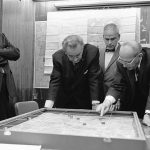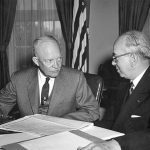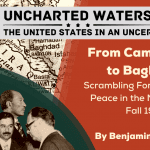by Mark Atwood Lawrence
Does history offer lessons for the present? This is an old and controversial question, on which historians vigorously disagree. Some routinely try to draw implications from the past for present-day debates, while others suggest that history is too malleable, subjective, and indeterminate to offer much guidance. Indeed, some scholars suggest that the main purpose of history, insofar as it is connected to present-day debates, is simply to remind us of the sheer complexity and unpredictability of events.
Skeptics about the possibility of drawing meaningful, specific, and persuasive lessons from history may be strengthened in their views by the two documents below. Both are speeches by prominent U.S. leaders from 2007, at a time when Americans were fiercely debating President George W. Bush’s plan to increase the number of American troops in Iraq despite persistent failure and frustration in the effort to impose peace and order in the country. In the first passage, part of a speech to the National Press Club in Washington on January 9, Democratic Senator Ted Kennedy of Massachusetts proposed legislation to block funding for the increase unless Congress explicitly approved. In the second, Bush defended the surge in a speech to the annual convention of the Veterans of Foreign Wars on August 22, by which time Americans were debating whether the increase was paying off.
Both Kennedy and Bush draw on the history of the Vietnam War in defending their positions, but they do so in utterly contradictory fashion. For Kennedy, the Vietnam War taught the need to understand the limits of American power; for Bush, it taught the need to use that power boldly. The starkness of this debate was, of course, nothing new in the annals of American efforts to draw on the history of American involvement in Vietnam in weighing later policy dilemmas. Since even before the end of the war in 1975, Americans have been arguing about the implications for the future conduct of U.S. foreign policy. The answers range across a broad spectrum of possibilities. Policymakers and politicians, journalists and scholars, have invoked the war in Vietnam to warn against action abroad and to urge bold intervention, to decry the influence of domestic politics on policymaking and to highlight the need for greater popular involvement, and to champion counter-insurgency methods and to advocate audacious conventional operations, to cite just three of the most jarring contradictions.
The remarkable malleability of the Vietnam analogy flows from at least two basic characteristics of the war and its place in American life since 1975. First, the Vietnam War was a sprawling event – or, more accurately, long series of events – that persisted over at least two decades and subsumed an enormous variety of experiences. It is therefore hardly surprising that different observers draw conflicting lessons. Much depends on which aspects of the war, in which period of time, one examines and which reminiscences one trusts. In this regard, the Vietnam analogy functions differently from the other historical point of reference cited frequently by U.S. policymakers over the last seven decades: the Munich conference of 1938 that allowed Nazi Germany to annex parts of Czechoslovakia. Whereas the Munich analogy generally carries just one message – appeasement encourages aggression – the Vietnam analogy contains any number of meanings.
Second, policymakers draw different lessons from the war because conflicting points of view are sustained passionately in the larger political culture. Most academic writing on the war advances the view that the political failings of the South Vietnamese state made it virtually impossible for the United States to achieve its objectives, but a larger body of literature – popular studies, battle accounts, and memoirs – points to a wide range of interpretive possibilities. At the same time, ordinary Americans continue to hold an array of basic attitudes about the war. Although majorities of Americans have viewed the war in Vietnam as a mistake ever since the fighting ended, polls show that substantial segments of the population have clung to the idea that the United States could have won if only the military had been allowed to wage the war free of constraints imposed by civilian leaders in Washington. Divisions over the basic meaning of the war are tenacious in part because Vietnam remains a proxy for disputes over fundamental political and cultural values, attitudes that are rarely altered by historical scholarship. Debates over the lessons of the war, that is, tap into deep cleavages about the nature of the American political system, the obligations of citizens toward government, and the validity of traditional patriotic values.
Speech by Senator Edward M. Kennedy on January 9, 2007
The American people sent a clear message in November that we must change course in Iraq and begin to withdraw our troops, not escalate their presence. The way to start is by acting on the President’s new plan. An escalation, whether it is called a surge or any other name, is still an escalation, and I believe it would be an immense new mistake. It would compound the original misguided decision to invade Iraq. We cannot simply speak out against an escalation of troops in Iraq. We must act to prevent it.
Our history makes clear that a new escalation in our forces will not advance our national security. It will not move Iraq toward self-government, and it will needlessly endanger our troops by injecting more of them into the middle of a civil war.
Some will disagree. Listen to this comment from a high-ranking American official: “It became clear that if we were prepared to stay the course, we could help to lay the cornerstone for a diverse and independent [region]. If we faltered, the forces of chaos would smell victory and decades of strife and aggression would stretch endlessly before us. The choice was clear. We would stay the course. And we shall stay the course.”
That is not President Bush speaking. It is President Lyndon Johnson, forty years ago, ordering a hundred thousand more American soldiers to Vietnam.
Here is another quotation. “The big problem is to get territory and to keep it. You can get it today and it will be gone next week. That is the problem. You have to have enough people to clear it and enough people to preserve what you have done.”
That is not President Bush on the need for more forces in Iraq. It is President Johnson in 1966 as he doubled our military presence in Vietnam.
Those comparisons from history resonate painfully in today’s debate on Iraq. In Vietnam, the White House grew increasingly obsessed with victory, and increasingly divorced from the will of the people and any rational policy. The Department of Defense kept assuring us that each new escalation in Vietnam would be the last. Instead, each one led only to the next….
Richard Nixon was elected President after telling the American people that he had a secret plan to end the war. We all know what happened, though. As President, he escalated the war into Cambodia and Laos, and it went on for six more years.
There was no military solution to that war. But we kept trying to find one anyway. In the end, 58,000 Americans died in the search for it.
Echoes of that disaster are all around us today. Iraq is George Bush’s Vietnam.
As with Vietnam, the only rational solution to the crisis is political, not military. Injecting more troops into a civil war is not the answer. Our men and women in uniform cannot force the Iraqi people to reconcile their differences.
The open-ended commitment of our military forces continues to enable the Iraqis to avoid taking responsibility for their own future. Tens of thousands of additional American troops will only make the Iraqis more resentful of America’s occupation. It will also make the Iraqi government even more dependent on America, not less….
This Congress cannot escape history or its own duty. If we do not learn from the mistakes of the past, we are condemned to repeat them. We must act, and act now, before the President sends more troops to Iraq, or else it will be too late….
The heavy price of our flawed decisions a generation ago is memorialized on sacred ground not far from here. On a somber walk through the Vietnam Memorial, we are moved by the painful, powerful eloquence of its enduring tribute to the tens of thousands who were lost in that tragic war that America never should have fought.
Our fingers can gently trace the names etched into the stark black granite face of the memorial. We wonder what might have been, if America had faced up honestly to its failed decisions before it was too late.
Speech by President George W. Bush on August 22, 2007
There are many differences between the wars we fought in the Far East and the war on terror we’re fighting today. But one important similarity is at their core they’re ideological struggles. The militarists of Japan and the communists in Korea and Vietnam were driven by a merciless vision for the proper ordering of humanity. They killed Americans because we stood in the way of their attempt to force their ideology on others.
Today, the names and places have changed, but the fundamental character of the struggle has not changed. Like our enemies in the past, the terrorists who wage war in Iraq and Afghanistan and other places seek to spread a political vision of their own — a harsh plan for life that crushes freedom, tolerance, and dissent.
Like our enemies in the past, they kill Americans because we stand in their way of imposing this ideology across a vital region of the world. This enemy is dangerous; this enemy is determined; and this enemy will be defeated.
We’re still in the early hours of the current ideological struggle, but we do know how the others ended — and that knowledge helps guide our efforts today. The ideals and interests that led America to help the Japanese turn defeat into democracy are the same that lead us to remain engaged in Afghanistan and Iraq.
The defense strategy that refused to hand the South Koreans over to a totalitarian neighbor helped raise up an Asian Tiger that is the model for developing countries across the world, including the Middle East. The result of American sacrifice and perseverance in Asia is a freer, more prosperous and stable continent whose people want to live in peace with America, not attack America….
[The Vietnam War] is a complex and painful subject for many Americans. The tragedy of Vietnam is too large to be contained in one speech. So I’m going to limit myself to one argument that has particular significance today. Then as now, people argued the real problem was America’s presence and that if we would just withdraw, the killing would end.
The argument that America’s presence in Indochina was dangerous had a long pedigree. In 1955, long before the United States had entered the war, Graham Greene wrote a novel called The Quiet American. It was set in Saigon, and the main character was a young government agent named Alden Pyle. He was a symbol of American purpose and patriotism – and dangerous naivete. Another character describes Alden this way: “I never knew a man who had better motives for all the trouble he caused.”
After America entered the Vietnam War, the Graham Greene argument gathered some steam. As a matter of fact, many argued that if we pulled out there would be no consequences for the Vietnamese people.
In 1972, one antiwar senator put it this way: “What earthly difference does it make to nomadic tribes or uneducated subsistence farmers in Vietnam or Cambodia or Laos, whether they have a military dictator, a royal prince or a socialist commissar in some distant capital that they’ve never seen and may never heard of?” A columnist for The New York Times wrote in a similar vein in 1975, just as Cambodia and Vietnam were falling to the communists: “It’s difficult to imagine,” he said, “how their lives could be anything but better with the Americans gone.” A headline on that story, dateline Phnom Penh, summed up the argument: “Indochina without Americans: For Most a Better Life.”
The world would learn just how costly these misimpressions would be. In Cambodia, the Khmer Rouge began a murderous rule in which hundreds of thousands of Cambodians died by starvation and torture and execution. In Vietnam, former allies of the United States and government workers and intellectuals and businessmen were sent off to prison camps, where tens of thousands perished. Hundreds of thousands more fled the country on rickety boats, many of them going to their graves in the South China Sea.
Three decades later, there is a legitimate debate about how we got into the Vietnam War and how we left. There’s no debate in my mind that the veterans from Vietnam deserve the high praise of the United States of America. Whatever your position is on that debate, one unmistakable legacy of Vietnam is that the price of America’s withdrawal was paid by millions of innocent citizens whose agonies would add to our vocabulary new terms like “boat people,” “re-education camps,” and “killing fields.”
There was another price to our withdrawal from Vietnam, and we can hear it in the words of the enemy we face in today’s struggle – those who came to our soil and killed thousands of citizens on September the 11th, 2001. In an interview with a Pakistani newspaper after the 9/11 attacks, Osama bin Laden declared that “the American people had risen against their government’s war in Vietnam. And they must do the same today.”
His number two man, Zawahiri, has also invoked Vietnam. In a letter to al Qaeda’s chief of operations in Iraq, Zawahiri pointed to “the aftermath of the collapse of the American power in Vietnam and how they ran and left their agents.”
Zawahiri later returned to this theme, declaring that the Americans “know better than others that there is no hope in victory. The Vietnam specter is closing every outlet.” Here at home, some can argue our withdrawal from Vietnam carried no price to American credibility – but the terrorists see it differently….
If we were to abandon the Iraqi people, the terrorists would be emboldened, and use their victory to gain new recruits. As we saw on September the 11th, a terrorist safe haven on the other side of the world can bring death and destruction to the streets of our own cities.
You May Also Like:
Mark Lawrence on why LBJ committed to the war in Vietnam



